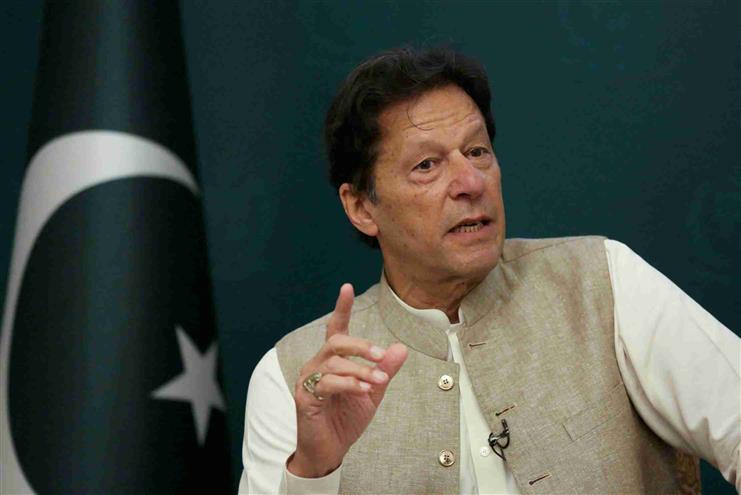Manas Dasgupta
NEW DELHI, March 30: With a key coalition partner deciding to switch sides at the last moment, it may be the end of the game for the Pakistani prime minister Imran Khan despite his repeated assertions that his government will win the trust vote in the National Assembly later this week.
Khan has taken a big gamble by asking the members of his Pakistan Tehreek-e-Insaf (PTI) party to stay away from the National Assembly on the day of voting on the no-confidence motion against his government, which is likely to be held on April 3 after four days debate on the opposition-sponsored motion beginning from Thursday.
Under the Pakistan Constitution, the motion will not get through unless the opposition can muster 172 votes in the 342-member National Assembly in favour of the no-trust motion in the Khan government. Khan’s move to keep his party members away from the House was to avoid possible cross-voting by the dissident members of his ruling PTI. But considering the respective strength of the various parties supporting the motion, Khan surviving the storm looked highly unlikely even if he succeeded in keeping the dissidents in his party at bay.
A key partner of the ruling coalition in Pakistan on Wednesday announcing that it would support no-confidence motion in the National Assembly, has come as a major blow to the embattled Prime Minister who has now effectively lost the majority in Parliament. Addressing a press conference, the Muttahida Qaumi Movement-Pakistan (MQM-P), a key ally of the Pakistan Tehreek-e-Insaf-led coalition government with seven members in the House, formally announced that it was joining the opposition ranks. MQM-P lawmakers Farogh Naseem and Aminul Haque, serving as federal ministers, submitted their resignations to the prime minister.
“We want to make a new beginning for politics of tolerance and true democracy,” said MQM-P chief Khalid Maqbool Siddiqui. Another ally of the ruling coalition, the Balochistan Awami Party (BAP) with five members in the lower house had announced on Monday that it had “accepted the opposition’s invitation” to vote against Khan.
Khan at the last moment also cancelled the earlier announced schedule of addressing the nation to apprise the people of the political situation and the “conspiracy” to oust his government creating a buzz that he could be considering to submit the resignation of his government ahead of the voting in Parliament where he is believed to be certain to lose.
But a senior minister of his government dismissed the speculations asserting that Khan would “play till the last ball is bowled” and also insisted that the government would emerge victorious. “Imran Khan is a player who fights till the last ball. There will not be a resignation. There will be a match, both friends and foes will watch it,” tweeted Pakistan Minister Fawad Chaudhry.
Khan had convened an emergency meeting of his cabinet on Wednesday to discuss the political moves to stall the no trust motion. Briefly talking to the media after the special session of cabinet chaired by the prime minister, the senior minister said Khan also shared the “threatening letter” with the cabinet colleagues, who in return expressed complete trust in him.
To a question if Khan would announce his resignation before the motion was voted, he said, “No way. He will fight till the last ball.” The minister also said that Khan himself or foreign minister Shah Mahmood Qureshi may also brief the parliament in-camera about the threatening letter.
Pakistan plunged into uncertainty on March 8 after the combined opposition submitted the motion with the National Assembly, which will convene on Thursday to debate the motion.
Khan, 69, is facing his toughest political test since assuming office in 2018 as defections in his party and cracks in the ruling coalition appeared to have made his position fragile. Khan is heading a coalition government and he can be removed if some of the partners decide to switch sides. The PTI has 155 members in the 342-member National Assembly and needs at least 172 lawmakers to retain power.
The PTI-led coalition in all had the support of 179 members but with two of its allied partners turning away from the government, its combined strength has come down the majority mark. In addition, Khan is facing a rebellion by his about two dozen lawmakers and allied parties.
Khan came to power in 2018 with promises to create a ‘Naya Pakistan’ but miserably failed to address the basic problem of keeping the prices of commodities in control, giving air to the sails of opposition ships to make war on his government.
No Pakistani prime minister has ever completed a full five-year term in office and fate of Khan did not look to be anyway different. But the only saving grace is that so far no prime minister in Pakistan’s history has ever been ousted through a no-confidence motion, and Khan is the third premier to face the challenge. On Tuesday, Prime Minister Khan strictly directed his party lawmakers to either abstain or not attend the National Assembly session on the day of voting on the no-confidence motion likely to be held on April 3.
If Imran Khan loses the vote, parliament can continue to function until its five-year tenure ends in August 2023, after which a general election is due within 60 days. There will be a vote in the National Assembly to elect a new Prime Minister to serve until then. Candidates can be put forward by any party with legislators in the assembly. The new Prime Minister can, however, call a general election immediately, without waiting until 2023. Some constitutional analysts say the assembly can be dissolved and a general election held if no candidate can secure a majority of votes to become the Prime Minister.

